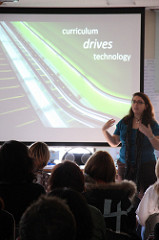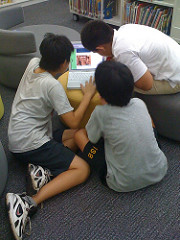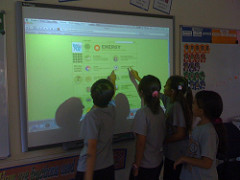We Are All Technology Teachers by Kim Cofino

Tools and ideas to transform education. Sign up below.
You are now subscribed
Your newsletter sign-up was successful
Cross posted on Always Learning
Last weekend I was honored to present a session at the Bridging the Gap conference at Yokohama International School in Japan. YIS has hosted this community conference annually since 2001, and the topic for this year was "The Future of Education: Using Its Tools Today." The three day conference included formal sessions led by teachers from YIS, other international schools and keynote presenter, Chris Toy, as well as a full day of BarCampunconference sessions. It was a great opportunity to dialogue about the way schools may look in the near future with not only teachers and administrators, but also parents and students.
One interesting topic of discussion came up on Saturday: an administrator asked me if we should be expecting classroom teachers to teach technology, to be responsible for this additional subject along with their standard course material. Basically the question was about the value of technology as an integrated subject (with all teachers responsible for the instruction) versus a discrete course (with one or two specialists responsible for the instruction). Interestingly, I haven't really had this conversation in a while, since ISB had adopted an integrated approach before I even arrived three years ago, but it certainly was a hot topic in both KL and Munich where I was part of the transition process from stand-alone IT courses to an integrated model.
Having developed and implemented an integrated technology program from scratch in two schools and expanded an existing program here at ISB, I firmly believe that technology is best taught within the context of the core curriculum. The natural use of authentic technology within the classroom setting, just like the way we use paper and pencil without any second thoughts, is always what I'm striving for.

A good analogy might be the way that over the past decade or two, classroom teachers have become more accustomed to the idea of differentiating for English language learners - especially in international schools, where often the majority of the class are not native English speakers. I have heard many administrators say "we are all ESL teachers," with the expectation that no matter what subject we teach, we must ensure that all students are engaged with material that's comprehensible to them. In all of the schools I've worked at, we've had extensive professional development in this area, and the consensus in education seems to be that if you're a teacher in a linguistically diverse class, it is your responsibility to employ some of the professional strategies of an ESL teacher, even if you yourself are a Math, Social Studies, Science, etc teacher. At this point, we're all comfortable with the fact that we can't simply give oral instructions, or that new vocabulary should be introduced in context, or that certain students might need more time to understand directions and perform certain tasks.
Maybe now it's time to say "we are all technology teachers."
I certainly understand that this is not a change that will happen overnight. Much like the move towards more ELL friendly instruction, teachers will need to learn appropriate skills, strategies and approaches to authentically and successfully embed technology within their core subject. Of course, this will take time, and during this transition, in my opinion, it's the responsibility of the technology facilitator (or coordinator or integration specialist or whatever they may be called) to help their colleagues build their understanding of successful technology-rich teaching practices.
Tools and ideas to transform education. Sign up below.
Often my colleague, Jeff, likes to say that his goal is to "work himself out of a job" by building teacher skill level to the point where they don't need him anymore. Although I would agree that this is also my ultimate goal, I am conscious of the speed with which technology changes, and I'm not sure that we will ever get to the point where schools will no longer need some sort of pedagogical support in the technology field. After all, most schools still have ESL specialists, even though many of their practices are adopted by mainstream teachers.

Similarly, most ESL programs have a mix of in-class and pull-out support - blending the best of both approaches to ensure that all students are learning and understanding both the language and the curricular content. Although I firmly believe technology should be embedded within classroom practice, I also see a place for discrete technology classes - especially when they are designed with a curricular context that enhances the learning in core subjects, or when they emphasis the process of learning how to learn with technology, or when they offer a specialized skill for students that are highly interested (like graphic design or Flash animation).
The important thing to remember, is that even if there are seperate technology courses offered at a school, that doesn't mean that those classes are the only place where students learn with technology. To continue to use the ESL anology one last time, a student who has a pull-out intensive ESL course isn't excused from using the English language in all of their other classes simply because they attend a class that focuses on language. Students and teachers should expect that technology will naturally be a part of every class.
What do you think? Should all teachers be technology teachers?
